Financial Law of Kazakhstan Yekaterina Kartseva, School of

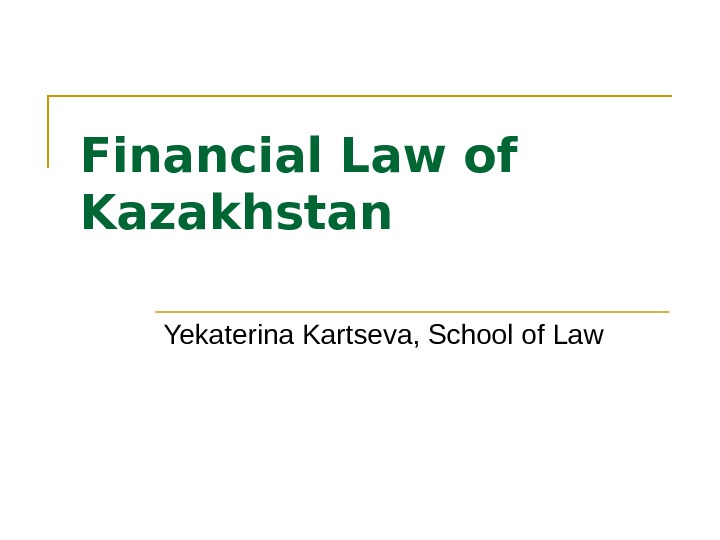
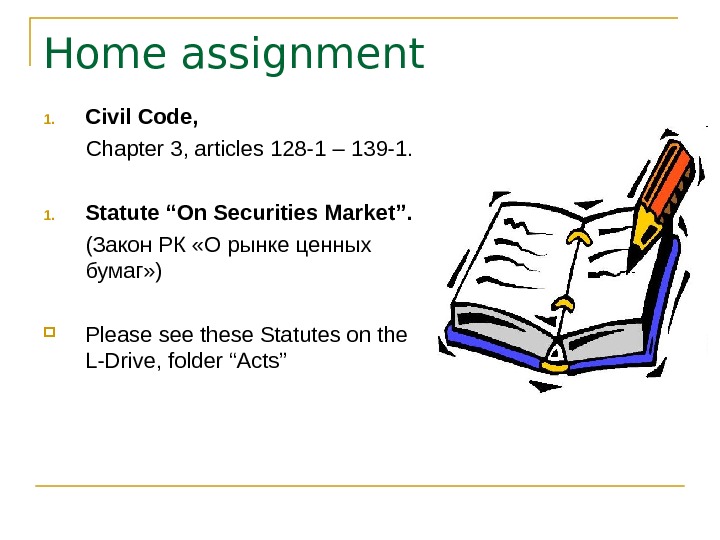
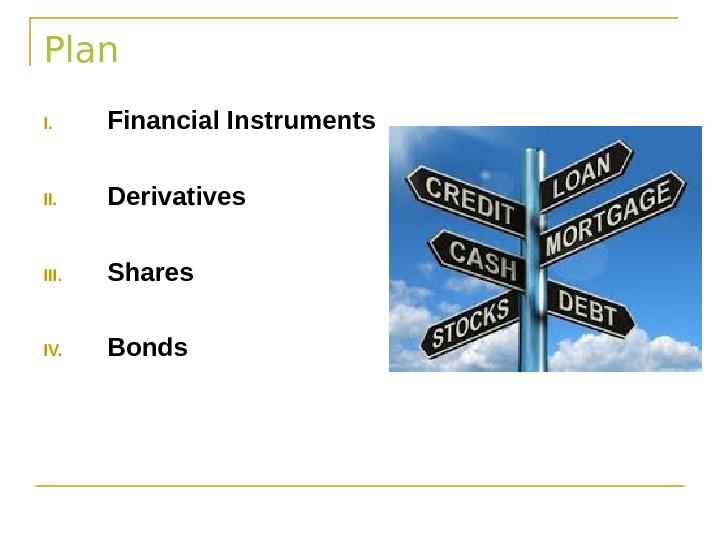
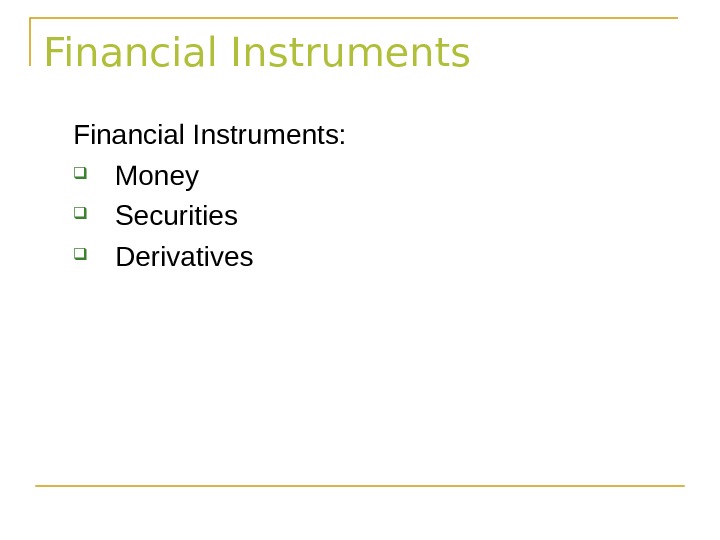
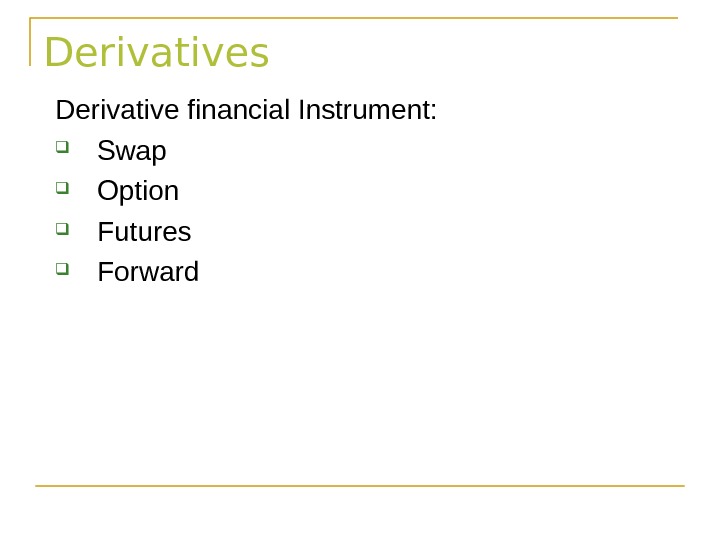
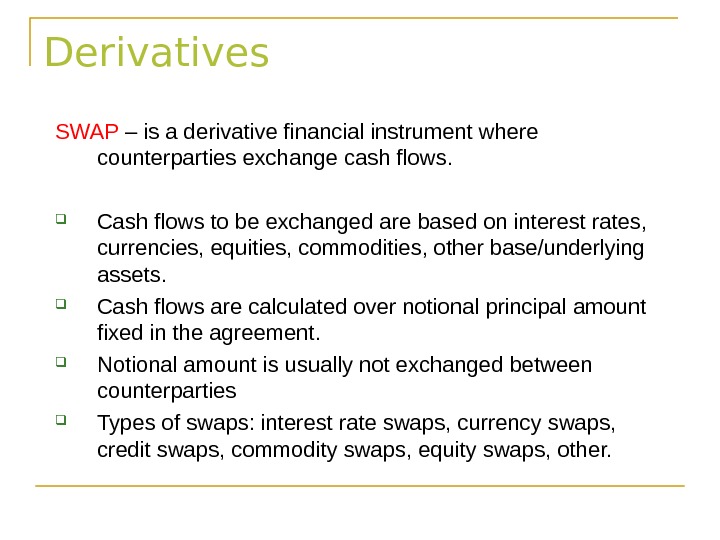
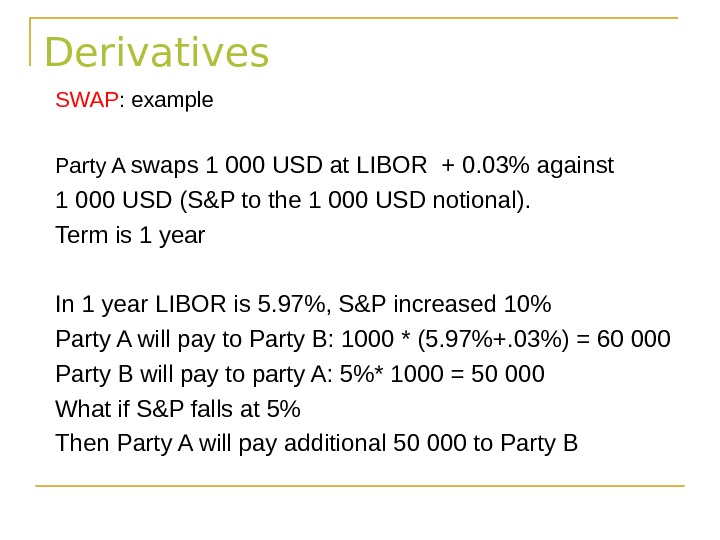
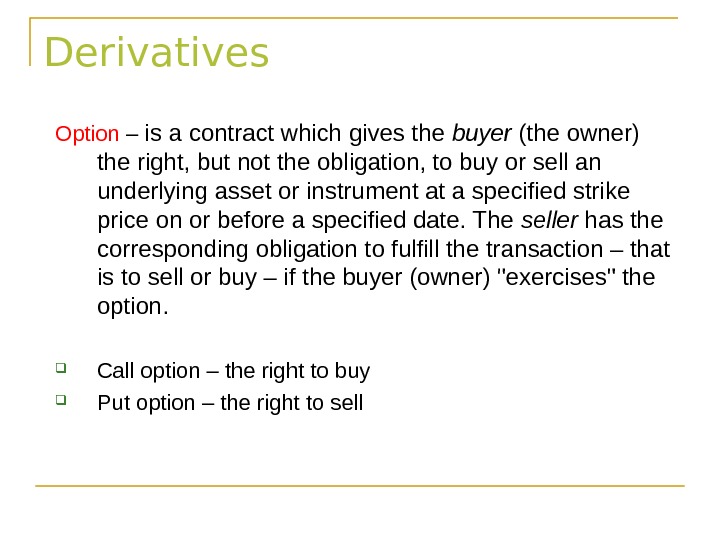
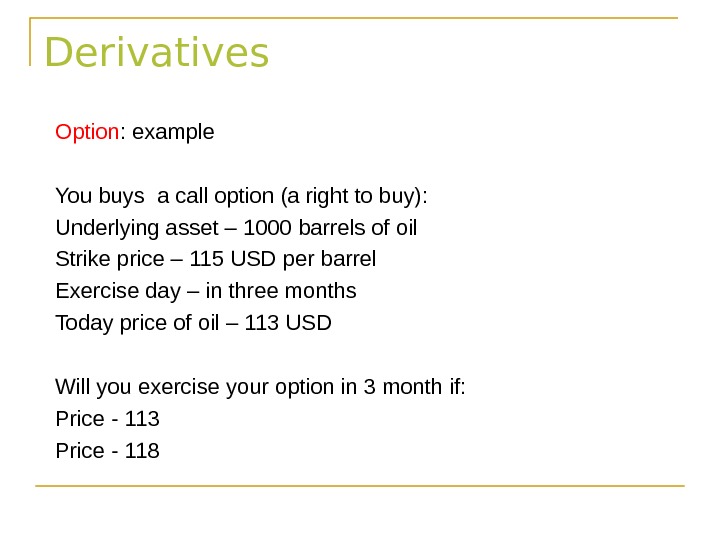
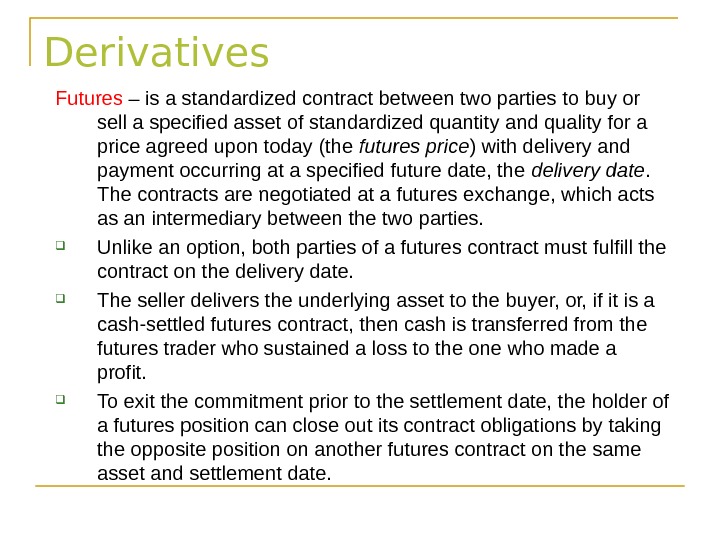
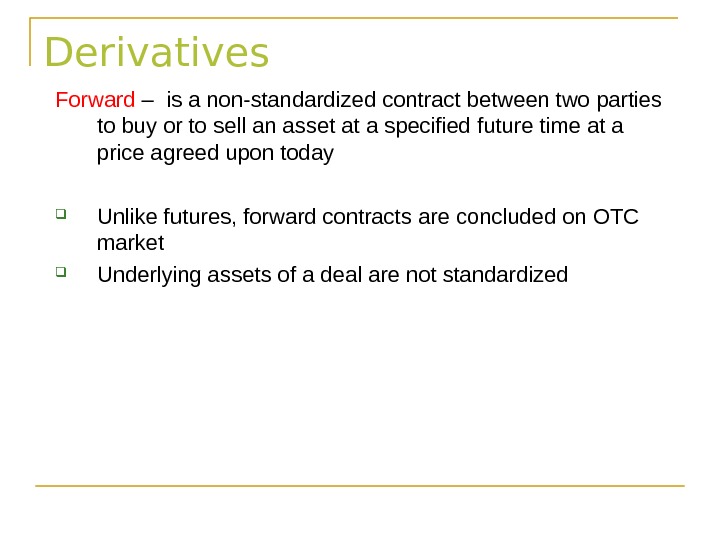
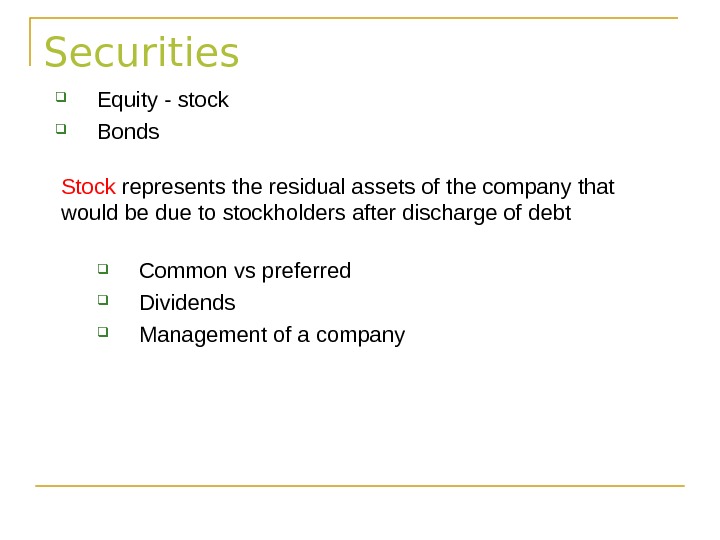
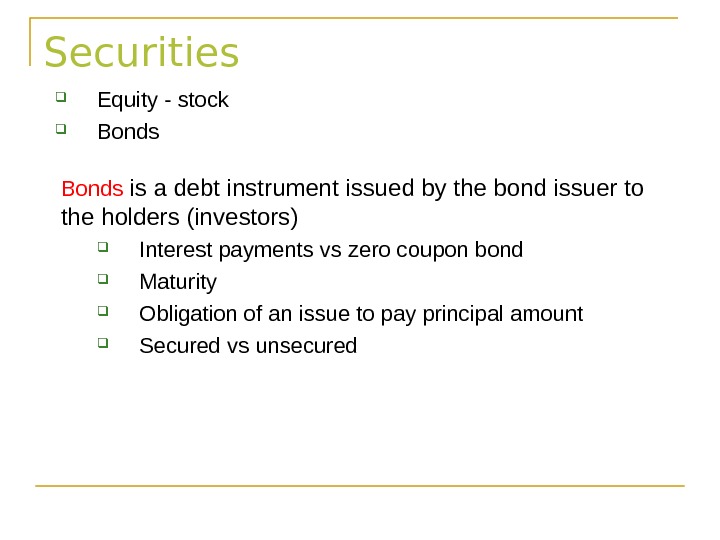
- Размер: 366.5 Кб
- Количество слайдов: 13
Описание презентации Financial Law of Kazakhstan Yekaterina Kartseva, School of по слайдам
 Financial Law of Kazakhstan Yekaterina Kartseva, School of Law
Financial Law of Kazakhstan Yekaterina Kartseva, School of Law
 Home assignment 1. Civil Code, Chapter 3, articles 128 -1 – 139 -1. 1. Statute “On Securities Market”. (Закон РК «О рынке ценных бумаг» ) Please see these Statutes on the L-Drive, folder “Acts”
Home assignment 1. Civil Code, Chapter 3, articles 128 -1 – 139 -1. 1. Statute “On Securities Market”. (Закон РК «О рынке ценных бумаг» ) Please see these Statutes on the L-Drive, folder “Acts”
 Plan I. Financial Instruments II. Derivatives III. Shares IV. Bonds
Plan I. Financial Instruments II. Derivatives III. Shares IV. Bonds
 Financial Instruments: Money Securities Derivatives
Financial Instruments: Money Securities Derivatives
 Derivatives Derivative financial Instrument: Swap Option Futures Forward
Derivatives Derivative financial Instrument: Swap Option Futures Forward
 Derivatives SWAP – is a derivative financial instrument where counterparties exchange cash flows. Cash flows to be exchanged are based on interest rates, currencies, equities, commodities, other base/underlying assets. Cash flows are calculated over notional principal amount fixed in the agreement. Notional amount is usually not exchanged between counterparties Types of swaps: interest rate swaps, currency swaps, credit swaps, commodity swaps, equity swaps, other.
Derivatives SWAP – is a derivative financial instrument where counterparties exchange cash flows. Cash flows to be exchanged are based on interest rates, currencies, equities, commodities, other base/underlying assets. Cash flows are calculated over notional principal amount fixed in the agreement. Notional amount is usually not exchanged between counterparties Types of swaps: interest rate swaps, currency swaps, credit swaps, commodity swaps, equity swaps, other.
 Derivatives SWAP : example Party A swaps 1 000 USD at LIBOR + 0. 03% against 1 000 USD (S&P to the 1 000 USD notional). Term is 1 year In 1 year LIBOR is 5. 97%, S&P increased 10% Party A will pay to Party B: 1000 * (5. 97%+. 03%) = 60 000 Party B will pay to party A: 5%* 1000 = 50 000 What if S&P falls at 5% Then Party A will pay additional 50 000 to Party
Derivatives SWAP : example Party A swaps 1 000 USD at LIBOR + 0. 03% against 1 000 USD (S&P to the 1 000 USD notional). Term is 1 year In 1 year LIBOR is 5. 97%, S&P increased 10% Party A will pay to Party B: 1000 * (5. 97%+. 03%) = 60 000 Party B will pay to party A: 5%* 1000 = 50 000 What if S&P falls at 5% Then Party A will pay additional 50 000 to Party
 Derivatives Option – is a contract which gives the buyer (the owner) the right, but not the obligation, to buy or sell an underlying asset or instrument at a specified strike price on or before a specified date. The seller has the corresponding obligation to fulfill the transaction – that is to sell or buy – if the buyer (owner) «exercises» the option. Call option – the right to buy Put option – the right to sell
Derivatives Option – is a contract which gives the buyer (the owner) the right, but not the obligation, to buy or sell an underlying asset or instrument at a specified strike price on or before a specified date. The seller has the corresponding obligation to fulfill the transaction – that is to sell or buy – if the buyer (owner) «exercises» the option. Call option – the right to buy Put option – the right to sell
 Derivatives Option : example You buys a call option (a right to buy): Underlying asset – 1000 barrels of oil Strike price – 115 USD per barrel Exercise day – in three months Today price of oil – 113 USD Will you exercise your option in 3 month if: Price — 113 Price —
Derivatives Option : example You buys a call option (a right to buy): Underlying asset – 1000 barrels of oil Strike price – 115 USD per barrel Exercise day – in three months Today price of oil – 113 USD Will you exercise your option in 3 month if: Price — 113 Price —
 Derivatives Futures – is a standardized contract between two parties to buy or sell a specified asset of standardized quantity and quality for a price agreed upon today (the futures price ) with delivery and payment occurring at a specified future date, the delivery date. The contracts are negotiated at a futures exchange, which acts as an intermediary between the two parties. Unlike an option, both parties of a futures contract must fulfill the contract on the delivery date. The seller delivers the underlying asset to the buyer, or, if it is a cash-settled futures contract, then cash is transferred from the futures trader who sustained a loss to the one who made a profit. To exit the commitment prior to the settlement date, the holder of a futures position can close out its contract obligations by taking the opposite position on another futures contract on the same asset and settlement date.
Derivatives Futures – is a standardized contract between two parties to buy or sell a specified asset of standardized quantity and quality for a price agreed upon today (the futures price ) with delivery and payment occurring at a specified future date, the delivery date. The contracts are negotiated at a futures exchange, which acts as an intermediary between the two parties. Unlike an option, both parties of a futures contract must fulfill the contract on the delivery date. The seller delivers the underlying asset to the buyer, or, if it is a cash-settled futures contract, then cash is transferred from the futures trader who sustained a loss to the one who made a profit. To exit the commitment prior to the settlement date, the holder of a futures position can close out its contract obligations by taking the opposite position on another futures contract on the same asset and settlement date.
 Derivatives Forward – is a non-standardized contract between two parties to buy or to sell an asset at a specified future time at a price agreed upon today Unlike futures, forward contracts are concluded on OTC market Underlying assets of a deal are not standardized
Derivatives Forward – is a non-standardized contract between two parties to buy or to sell an asset at a specified future time at a price agreed upon today Unlike futures, forward contracts are concluded on OTC market Underlying assets of a deal are not standardized
 Securities Equity — stock Bonds Stock represents the residual assets of the company that would be due to stockholders after discharge of debt Common vs preferred Dividends Management of a company
Securities Equity — stock Bonds Stock represents the residual assets of the company that would be due to stockholders after discharge of debt Common vs preferred Dividends Management of a company
 Securities Equity — stock Bonds is a debt instrument issued by the bond issuer to the holders (investors) Interest payments vs zero coupon bond Maturity Obligation of an issue to pay principal amount Secured vs unsecured
Securities Equity — stock Bonds is a debt instrument issued by the bond issuer to the holders (investors) Interest payments vs zero coupon bond Maturity Obligation of an issue to pay principal amount Secured vs unsecured

